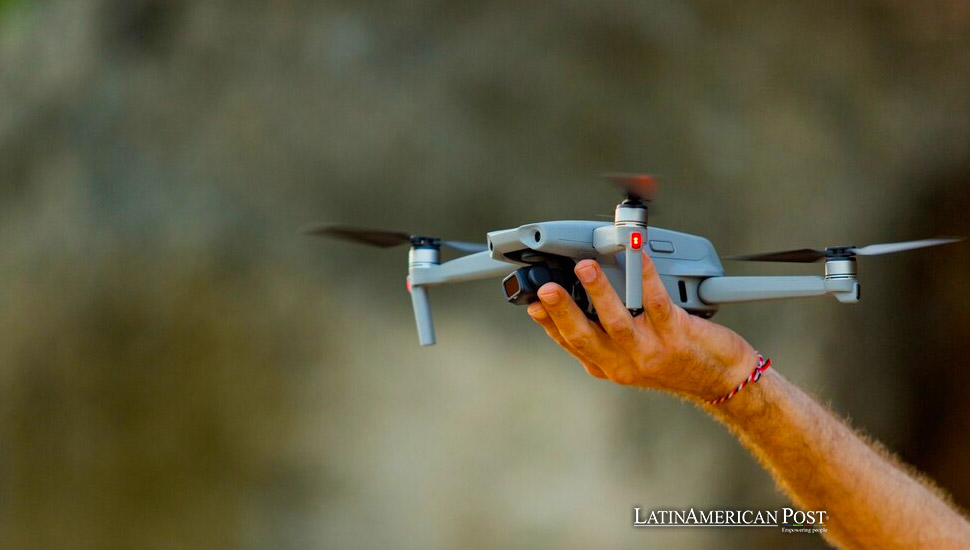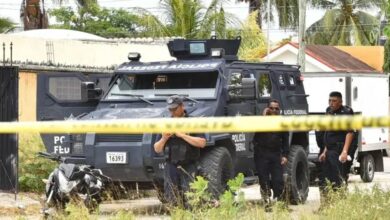Mexican Soldiers Fall to Cartel Drone Warfare Technology

Mexican army soldiers have been killed by drone strikes launched by drug cartels, marking a deadly escalation in the ongoing conflict in Michoacan, as confirmed by Defense Secretary Gen. Luis Cresencio Sandoval.
In a chilling revelation that underscores the escalating violence in Mexico’s ongoing war against drug cartels, Defense Secretary Gen. Luis Cresencio Sandoval acknowledged for the first time on Friday that Mexican soldiers have been killed by bomb-dropping drones operated by these criminal groups. This disclosure highlights a new and deadly phase in the cartels’ evolving tactics.
Although Sandoval refrained from providing specific figures on the number of casualties, he confirmed that the majority of these fatal attacks occurred in the western state of Michoacan. This region has been a hotbed of conflict as the Jalisco New Generation Cartel (CJNG) battles local gangs for territorial dominance.
“Our personnel have suffered wounds, and some of our troops have even died in these attacks,” Sandoval stated, marking a significant shift from previous acknowledgments, which only noted injuries from improvised explosive devices (IEDs) in the region. The exact timing of these drone attacks remains undisclosed, but Sandoval hinted that they primarily targeted army patrol units.
Military Anti-Drone Systems on the Horizon
In response to these sophisticated threats, the army is actively seeking to bolster its defenses by acquiring anti-drone systems. “What we are seeking with this anti-drone equipment is to have the security capability, which we lack, for our personnel performing reconnaissance and patrols,” Sandoval explained. This move is part of a broader strategy to enhance military personnel’s safety and operational effectiveness on the ground.
Despite the rising threat from aerial attacks, Sandoval emphasized that roadside bombs continue to pose a more frequent danger to army units. The use of IEDs, trenches, pillboxes, homemade armored vehicles, and sniper rifles by the cartels has turned Michoacan into a veritable war zone. This militarization of cartel tactics reflects their determination to maintain control over lucrative drug trafficking routes and territories.
The CJNG, one of Mexico’s most influential and violent drug trafficking organizations, has been at the forefront of this conflict. Their innovative use of drones to drop explosives represents a significant escalation in the technology and methods employed by cartels. This development not only poses a severe threat to Mexican security forces but also highlights the cartels’ capacity to adapt and evolve in response to military pressure.
The implications of this development are profound. The use of drones by cartels marks a new chapter in the asymmetric warfare that characterizes Mexico’s drug conflict. It demonstrates a level of sophistication and resourcefulness that complicates traditional military strategies. The Mexican army’s efforts to counteract this threat will likely involve significant investments in technology and changes in tactical approaches.
The violence in Michoacan, driven by the CJNG’s relentless push for control, has had devastating effects on the local population. The constant threat of violence, the presence of heavily armed groups, and the use of explosives have created a climate of fear and instability. Civilians are often caught in the crossfire, leading to displacement and severe disruptions to daily life.
Combating these technologically advanced cartels presents a multifaceted challenge for the Mexican government. It requires not only military solutions but also efforts to address the root causes of cartel power, including corruption, economic inequality, and weak law enforcement institutions. Introducing anti-drone systems is necessary, but it is part of a broader strategy needed to restore peace and security in affected regions.
In the international arena, the use of drones by cartels in Mexico may also set a worrying precedent for other criminal organizations worldwide. The relatively low cost and ease of access to drone technology mean that this tactic could spread to other conflict zones, further complicating global efforts to combat organized crime and terrorism.
Soldiers’ Sacrifices Highlight Urgent Need for Solutions
As the Mexican army adapts to these new threats, the bravery and sacrifices of its soldiers remain at the forefront of this battle. The acknowledgment of deaths due to drone attacks serves as a sad reminder of the human cost of this conflict. It also underscores the urgency of developing and implementing effective countermeasures to protect those on the front lines.
The ongoing struggle in Michoacan starkly illustrates the broader challenges faced by Mexico in its fight against drug cartels. It highlights the evolving nature of this conflict and the need for continuous adaptation and resilience. As the Mexican army grapples with these new realities, the support and collaboration of international partners will be crucial in addressing this complex and dynamic threat.
Also read: 2.3% of Jobs in Mexico at Risk of AI Automation
The Mexican army’s acknowledgment of soldier fatalities from cartel-operated drones marks a significant and concerning development in the country’s ongoing battle against drug-related violence. The adaptation of cartels to use sophisticated technology like drones poses a severe challenge to traditional military tactics. It highlights the need for innovative and comprehensive strategies to restore security and peace in affected regions. As Mexico confronts this new phase of the conflict, the sacrifices of its soldiers serve as a poignant reminder of the stakes involved and the urgent need for practical solutions.





